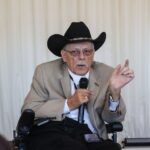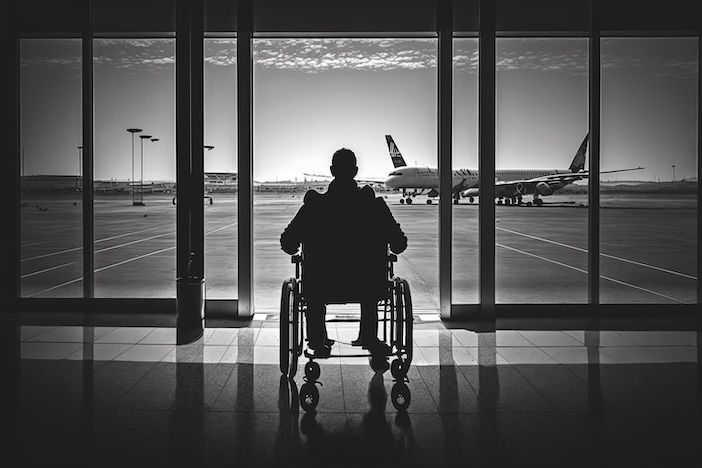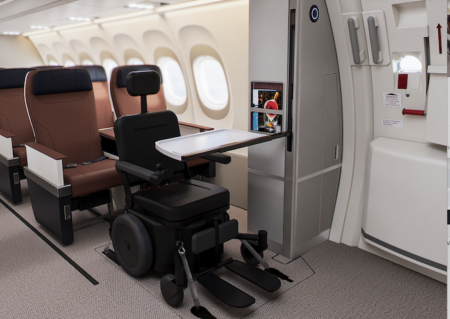All Wheels Up (AWU), the US-based non-profit organisation advancing work that can enable WC-19 rated wheelchair users to remain in their own wheelchairs on commercial airline flights, has announced it has made “positive progress” with the FAA.
According to AWU, in September, during a presentation at its Global Forum in Boston, which was attended by 130 industry stakeholders, a representative from the Federal Aviation Administration (FAA) indicated that AWU is now closer to achieving its goal and that wheelchair users can be optimistic that an improved air travel experience is coming.
You can see selected highlights from the event HERE.
The FAA is currently in the process of setting parameters for the testing and certification of wheelchair tie-down systems for aircraft cabins, with the physical work due to begin in 2025.

“Currently we have not identified any major issues to installation, and mitigations for any minor issues are being developed,” said Kelly Buckland, disability policy advisor at the U.S Department of Transportation. “We anticipate being able to make a recommendation on installing the tie-down systems by the end of 2025, and from there it would take an airline or another group to request the approval and begin modifying the cabin interior layout to accommodate a wheelchair in the cabin. It is also anticipated that DOT would start rulemaking in early 2026 to require wheelchairs be accommodated in the cabin.
“There are still some operational pieces that will need to be discussed with the FAA, and possibly the need to request an exemption for use,” added Buckland.
This process can be aided by the guidance and partnership offered by AWU and organisations it works with, such as Paralyzed Veterans of America (PVA – an organisation dedicated to benefiting and representing veterans with spinal cord injury or diseases) and The National Institute of Aviation Research (NIAR) in Kansas.
“This has been a 15-year journey that we have worked so hard to see come closer to fruition,” said Michelle Erwin, CEO of AWU, who founded the organisation in 2011. Erwin has seen first-hand the challenges of disabled travel, as her son uses a wheelchair. We ran a piece by Michele Erwin earlier this year.
“We are so grateful for the support of so many stakeholders, most notably PVA and NIAR, to get us to this point,” she added. “There is still work to be done, but it’s not a question of why or how anymore, it’s a question of when. This meaningful benchmark is important on many levels. With federal action imminent, the work is about to pay off.”
This news follows the 2024 bipartisan Federal Aviation Administration (FAA) Reauthorization Act, which was signed into law in May by President Joe Biden. The bill authorises funding for the FAA to continue its role and responsibilities for five more years, and includes several disability access measures that wheelchair users have wanted for years.
Testing plans
While some testing has been carried out to date, AWU hopes that this news will encourage industry stakeholders to work together to expedite the approval and implementation of wheelchair tie-down systems in aircraft.
For example, Luis Gomez, manager at Advanced Virtual Engineering and Testing Laboratories (AVET) at Wichita State University, which works with AWU stated, “I am happy that our previous testing has answered many engineering questions and has allowed us to move forward. Our work with All Wheels up and our continued testing is a validation for the need to have policy changed.”
While a lot of research and development lies ahead, the positive sentiments from the FAA and US DOT gives advocates like Erwin hope for the future of air travel.
“We want to let this testing and research take its course,” said Erwin. “We know this will take a lot of investment and effort from the FAA, the Department of Transportation, the airlines, our organisation, and our advocacy partners.”
With a resolution to a decades-long problem on the horizon, AWU is hopeful that its goal for a wheelchair spot in planes will be achieved. “It is amazing to think we are getting so much closer to accomplishing what we set out to do,” added Erwin. “It has been a team effort for all stakeholders. I am so proud of the progress made and confident we will finish the job.”
“This is exciting news for all of us. This is huge progress, but it will take time. We are so close.”





